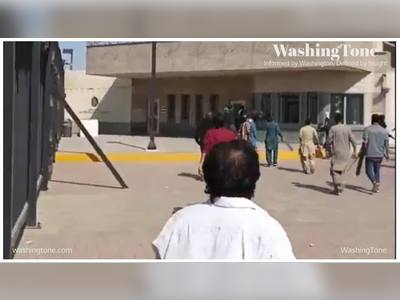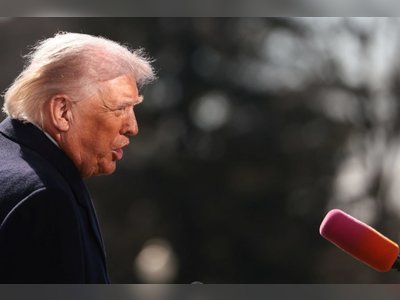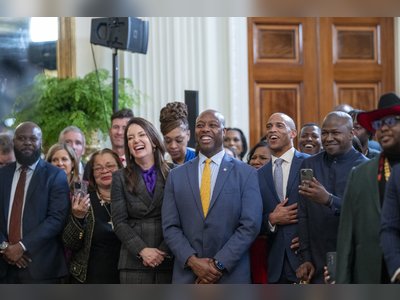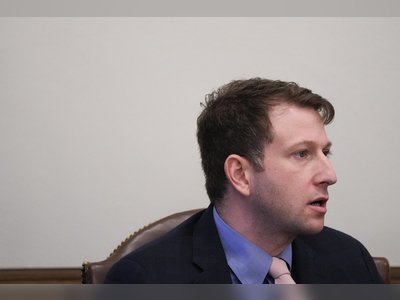White HouseSenateThe HouseSupreme CourtFederal ReserveDOJState DepartmentTreasuryCensusBudget OfficeTrade Representative
WashingTone
Informed by Washington, Defined by Insight
Monday, Mar 02, 2026
WashingTone

Business Trends and Outlook Survey Adds Key Work-From-Home Metrics as Remote Work Continues to Shape the Economy
The addition of work-from-home questions to the Business Trends and Outlook Survey (BTOS) reflects the growing importance of remote work in the U.S. economy and its implications for business operations and policymaking.
On November 4, 2024, the U.S. Census Bureau announced an important update to the Business Trends and Outlook Survey (BTOS) for its second cycle (11/4/2024-1/26/2025).
In response to the growing role of remote work, eleven new questions have been added to the survey to measure the scope, frequency, challenges, management policies, and overall impact of work-from-home (WFH) practices on U.S. businesses.
This update is a direct response to the increasing importance of WFH arrangements, which became essential during the COVID-19 pandemic and continue to play a key role in modern work environments.
WFH’s Lasting Impact: Filling Data Gaps
The pandemic prompted a rapid and widespread shift to remote work, and while its immediate impact has been extensively studied, gaps remain in understanding its long-term effects from the business perspective.
Many existing surveys have failed to capture the full scope of WFH, leaving policymakers and businesses with an incomplete picture of how remote work is shaping operations, productivity, and workforce management.
The new questions in the BTOS aim to bridge this data gap, providing critical insights into how businesses are adapting to the ongoing shift toward remote work.
The added questions will cover key topics such as the proportion of employees working from home, the frequency of remote work, the challenges faced by businesses in managing remote teams, and the broader business impacts of this work arrangement.
These data points will allow for a more nuanced understanding of how WFH is being implemented across different sectors, geographic regions, and company sizes, helping to inform both business strategies and government policies.
The Scope and Reach of the BTOS
The BTOS provides valuable real-time data on key economic indicators, and the new WFH questions will be integral to the survey’s ongoing mission to monitor the health of the U.S. economy.
With data collected biweekly from approximately 1.2 million businesses across the country, the BTOS is one of the largest and most comprehensive economic surveys available.
By offering a snapshot of the business landscape at regular intervals, the survey is particularly effective at tracking rapid changes in economic conditions, such as those triggered by natural disasters, economic crises, and, now, the widespread adoption of remote work.
The BTOS covers a wide range of business sectors and provides insights at the national, state, and metropolitan levels.
It also includes specific subsector details, allowing for a granular understanding of how different industries are experiencing the transition to remote work.
These features make the BTOS an essential tool for policymakers, business leaders, and economic analysts seeking to understand the evolving economic environment.
Data-Driven Policymaking and Economic Planning
The inclusion of WFH data in the BTOS has significant implications for both business strategy and government policymaking.
At the federal, state, and local levels, officials rely on BTOS data to monitor economic conditions, track the effects of various policy initiatives, and identify areas that require support or intervention.
The availability of detailed WFH data will provide policymakers with the tools they need to assess the impact of remote work on economic recovery, labor markets, and workforce participation.
For businesses, the BTOS data serves as a critical resource for making informed decisions about workforce management, resource allocation, and growth strategies.
As remote work continues to evolve, understanding the experiences and challenges of other companies will help businesses adapt to changing workforce dynamics.
By gaining insights into industry-wide trends, businesses can refine their strategies, invest in technology, and make adjustments to their organizational structures to better align with the new work environment.
Broader Economic Implications of Work-from-Home Trends
The work-from-home trend has far-reaching implications for various sectors of the economy.
On one hand, businesses that are able to adapt to remote work arrangements have benefited from reduced overhead costs, increased access to a global talent pool, and improved employee work-life balance.
On the other hand, industries that rely heavily on in-person interactions, such as retail, hospitality, and manufacturing, have faced challenges in maintaining operations and profitability during the pandemic and beyond.
The shift to remote work has also had a lasting impact on real estate markets, both commercial and residential.
As more companies adopt hybrid work models, demand for office space has declined in many urban centers, leading to changes in commercial real estate pricing and a reevaluation of the future of office buildings.
In contrast, the increased demand for home office space has driven up housing prices in suburban and rural areas, as workers seek more spacious living arrangements outside dense city centers.
The growing prevalence of remote work has also highlighted disparities in access to technology, internet connectivity, and workplace accommodations.
Ensuring equitable access to remote work opportunities remains a key challenge, especially in underserved communities.
Addressing these gaps will be crucial in ensuring that the benefits of WFH are accessible to all workers, regardless of their location or socioeconomic status.
The Future of Remote Work and Ongoing Research Needs
As remote work continues to evolve, it is likely that its long-term impact on the economy and the workplace will remain a subject of ongoing research and analysis.
While the BTOS survey provides valuable insights into current trends, additional data will be needed to fully understand how WFH affects productivity, job satisfaction, and organizational culture over time.
In the coming years, it is expected that new surveys and research initiatives will continue to track the development of remote work across various sectors.
The BTOS will be a key part of this effort, offering timely data on the changing dynamics of the workforce and providing valuable insights for businesses, policymakers, and workers themselves.
Conclusion: A Vital Tool for Understanding Economic Shifts
The addition of work-from-home questions to the Business Trends and Outlook Survey marks an important step in understanding the shifting landscape of the U.S. workforce.
As remote work becomes a permanent fixture in many industries, the data provided by the BTOS will be essential for shaping future business strategies and government policies.
By capturing the challenges, benefits, and economic impact of WFH, this initiative offers a comprehensive view of the changing nature of work in the U.S. economy and provides the insights needed to navigate the future of work.
In response to the growing role of remote work, eleven new questions have been added to the survey to measure the scope, frequency, challenges, management policies, and overall impact of work-from-home (WFH) practices on U.S. businesses.
This update is a direct response to the increasing importance of WFH arrangements, which became essential during the COVID-19 pandemic and continue to play a key role in modern work environments.
WFH’s Lasting Impact: Filling Data Gaps
The pandemic prompted a rapid and widespread shift to remote work, and while its immediate impact has been extensively studied, gaps remain in understanding its long-term effects from the business perspective.
Many existing surveys have failed to capture the full scope of WFH, leaving policymakers and businesses with an incomplete picture of how remote work is shaping operations, productivity, and workforce management.
The new questions in the BTOS aim to bridge this data gap, providing critical insights into how businesses are adapting to the ongoing shift toward remote work.
The added questions will cover key topics such as the proportion of employees working from home, the frequency of remote work, the challenges faced by businesses in managing remote teams, and the broader business impacts of this work arrangement.
These data points will allow for a more nuanced understanding of how WFH is being implemented across different sectors, geographic regions, and company sizes, helping to inform both business strategies and government policies.
The Scope and Reach of the BTOS
The BTOS provides valuable real-time data on key economic indicators, and the new WFH questions will be integral to the survey’s ongoing mission to monitor the health of the U.S. economy.
With data collected biweekly from approximately 1.2 million businesses across the country, the BTOS is one of the largest and most comprehensive economic surveys available.
By offering a snapshot of the business landscape at regular intervals, the survey is particularly effective at tracking rapid changes in economic conditions, such as those triggered by natural disasters, economic crises, and, now, the widespread adoption of remote work.
The BTOS covers a wide range of business sectors and provides insights at the national, state, and metropolitan levels.
It also includes specific subsector details, allowing for a granular understanding of how different industries are experiencing the transition to remote work.
These features make the BTOS an essential tool for policymakers, business leaders, and economic analysts seeking to understand the evolving economic environment.
Data-Driven Policymaking and Economic Planning
The inclusion of WFH data in the BTOS has significant implications for both business strategy and government policymaking.
At the federal, state, and local levels, officials rely on BTOS data to monitor economic conditions, track the effects of various policy initiatives, and identify areas that require support or intervention.
The availability of detailed WFH data will provide policymakers with the tools they need to assess the impact of remote work on economic recovery, labor markets, and workforce participation.
For businesses, the BTOS data serves as a critical resource for making informed decisions about workforce management, resource allocation, and growth strategies.
As remote work continues to evolve, understanding the experiences and challenges of other companies will help businesses adapt to changing workforce dynamics.
By gaining insights into industry-wide trends, businesses can refine their strategies, invest in technology, and make adjustments to their organizational structures to better align with the new work environment.
Broader Economic Implications of Work-from-Home Trends
The work-from-home trend has far-reaching implications for various sectors of the economy.
On one hand, businesses that are able to adapt to remote work arrangements have benefited from reduced overhead costs, increased access to a global talent pool, and improved employee work-life balance.
On the other hand, industries that rely heavily on in-person interactions, such as retail, hospitality, and manufacturing, have faced challenges in maintaining operations and profitability during the pandemic and beyond.
The shift to remote work has also had a lasting impact on real estate markets, both commercial and residential.
As more companies adopt hybrid work models, demand for office space has declined in many urban centers, leading to changes in commercial real estate pricing and a reevaluation of the future of office buildings.
In contrast, the increased demand for home office space has driven up housing prices in suburban and rural areas, as workers seek more spacious living arrangements outside dense city centers.
The growing prevalence of remote work has also highlighted disparities in access to technology, internet connectivity, and workplace accommodations.
Ensuring equitable access to remote work opportunities remains a key challenge, especially in underserved communities.
Addressing these gaps will be crucial in ensuring that the benefits of WFH are accessible to all workers, regardless of their location or socioeconomic status.
The Future of Remote Work and Ongoing Research Needs
As remote work continues to evolve, it is likely that its long-term impact on the economy and the workplace will remain a subject of ongoing research and analysis.
While the BTOS survey provides valuable insights into current trends, additional data will be needed to fully understand how WFH affects productivity, job satisfaction, and organizational culture over time.
In the coming years, it is expected that new surveys and research initiatives will continue to track the development of remote work across various sectors.
The BTOS will be a key part of this effort, offering timely data on the changing dynamics of the workforce and providing valuable insights for businesses, policymakers, and workers themselves.
Conclusion: A Vital Tool for Understanding Economic Shifts
The addition of work-from-home questions to the Business Trends and Outlook Survey marks an important step in understanding the shifting landscape of the U.S. workforce.
As remote work becomes a permanent fixture in many industries, the data provided by the BTOS will be essential for shaping future business strategies and government policies.
By capturing the challenges, benefits, and economic impact of WFH, this initiative offers a comprehensive view of the changing nature of work in the U.S. economy and provides the insights needed to navigate the future of work.











